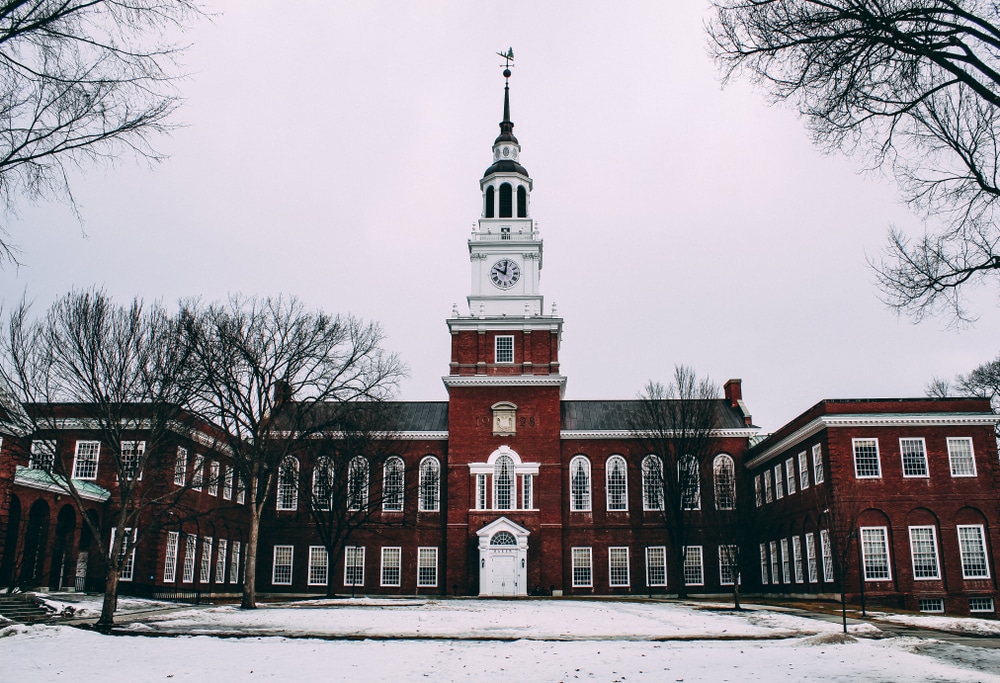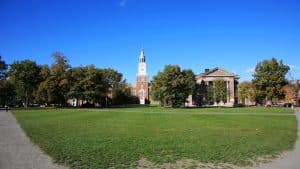Where is Dartmouth Located?
Dartmouth, located in Hanover, New Hampshire, is an Ivy League institution known for its academic excellence and tight-knit community. This blog will cover everything about Dartmouth College, from its exact location to the facilities it offers and its impact on the local community and culture.
Where is Dartmouth located?
Dartmouth College is located in Hanover, New Hampshire. The surroundings of the Connecticut River and the Upper Valley enhance its beauty. This setting is part of the Dartmouth experience.
Hanover, with its small-town charm, offers shops, restaurants, and cultural venues, ensuring you have activities outside of your studies. The integration of Dartmouth into this town enriches your academic life and connects you with a community that welcomes you. Dartmouth’s location in Hanover creates a unique environment for your college journey.
Is Dartmouth private or public?
Dartmouth College is an Ivy League private institution. Located in Hanover, New Hampshire, it combines traditional education with innovation. Let’s explore what makes Dartmouth a distinctive place for academic and personal growth.
Dartmouth’s Education Philosophy
Dartmouth offers a liberal arts education, encouraging exploration of various subjects. This approach helps develop versatile skills, preparing you for future challenges. Dartmouth focuses on teaching you to think critically and creatively.
Emphasizing Undergraduate Research
Dartmouth prioritizes undergraduate research. Working closely with faculty on impactful research projects is a cornerstone of the Dartmouth experience, providing hands-on experience that prepares you for leadership roles.
World-Class Faculty
Dartmouth’s faculty are mentors and collaborators. With a low student-to-faculty ratio, you receive personalized attention. This support ensures you’re an integral part of the Dartmouth community.
Dartmouth Alumni Network
Joining Dartmouth connects you to a global alumni network that offers mentorship, internships, and career advancement opportunities. Dartmouth alumni are supportive, sharing a bond that extends beyond college years.
Undergraduate Experience
Dartmouth offers clubs, outdoor activities, and community service opportunities, encouraging engagement with the world. This approach ensures you leave Dartmouth with experiences that shape you as an individual.
A Brief History of Dartmouth
Eleazar Wheelock, a minister from Connecticut, set up Dartmouth College in 1769 with a unique mission to educate Native American and English youth. The college got its name from William Legge, the 2nd Earl of Dartmouth, who supported Wheelock’s initiative.
Right from its early days, Dartmouth faced financial and political challenges. One notable challenge was the Dartmouth College v. Woodward court case in 1819, argued by alumnus Daniel Webster, which helped Dartmouth remain a private institution by confirming that private corporations are protected under the Constitution.
Dartmouth Expands
During the 19th and early 20th centuries, Dartmouth broadened its curriculum to include science, business, and engineering programs. This period marked significant growth, with the introduction of the Tuck School of Business in 1900, one of the first of its kind, and the Thayer School of Engineering.
Diversity at Dartmouth
Dartmouth has always valued educating a broad spectrum of students. This expanded over time to welcome women in 1972 and to establish supportive programs like the Native American Program. Dartmouth works hard to foster an inclusive environment for everyone.
Academic Excellence Today
Dartmouth is recognized for its liberal arts curriculum and a teaching model that promotes close interaction between students and faculty. This approach has contributed to significant achievements in various fields.
How big is the Dartmouth campus?
Located in Hanover, New Hampshire, Dartmouth College’s 269-acre campus blends historic buildings with modern facilities. The Green, surrounded by Dartmouth Hall and Baker Library, is a central outdoor area where students gather, symbolizing the community spirit and academic ambition Dartmouth is known for.
The campus’s academic excellence is evident in its facilities, such as the Black Family Visual Arts Center and the Class of 1978 Life Sciences Center, which support research and learning. The Baker-Berry Library, with its extensive collections, striking architecture, and Orozco murals, provides a unique environment for study and research.
Housing options at Dartmouth range from traditional dormitories to themed communities, fostering friendships and exploring interests. The college’s focus on sustainability includes energy-efficient buildings and recycling programs, reflecting its commitment to environmental stewardship.
Athletic facilities support physical wellness with equipment and spaces for sports and fitness. Dartmouth’s location also offers outdoor activities like hiking, skiing, and kayaking, thanks to its proximity to natural landscapes.
What are the available facilities inside Dartmouth?
Dartmouth College offers a variety of facilities for academic, athletic, social, and cultural needs. Here’s a guide:
- Classrooms: These are designated for teaching and learning activities. Managed by the Registrar, they are also available for purposes outside the standard academic schedule, including 8:00 am to 6:00 pm, Monday through Friday.
- Alumni Gym: This facility is a center for physical education, accommodating athletic teams, fitness classes, and personal training sessions. It can also host special events during the off-season with permission from the Athletic Department.
- Leverone Field House: Primarily used for athletics, like track and field events, this indoor space is available for other functions during the off-season, indicating the college’s efficient use of its athletic facilities.
- Berry Sports Center: While primarily supporting athletic programs, this center can also be used for non-athletic events in the off-season, providing a multipurpose space for the college community.
- Collis Center: Dartmouth’s student center offers spaces for student groups, including meeting rooms and event spaces. It emphasizes student leadership and engagement, prioritizing student activities while being available for other college departments.
- Spaulding Auditorium: Located in the Hopkins Center for the Arts, it’s a prime venue for music, theater, and dance, primarily for Hopkins Center programs. Its limited availability for other uses ensures it remains a key space for artistic expression.
- Moore Theater: Another part of the Hopkins Center, it hosts a variety of performances, highlighting the college’s focus on the performing arts as an essential part of its cultural and educational landscape.
- Warner Bentley Theater: A smaller venue within the Hopkins Center, offering an intimate setting for performances and events, contributing to Dartmouth’s vibrant arts scene.
- Faculty Lounge at the Hopkins Center (The Hop): This area is for faculty-sponsored events, facilitating academic gatherings, seminars, and receptions, enhancing faculty interaction and collaboration.
- Top of the Hop & Alumni Hall: Available for student organizations for events, supporting student initiatives, and providing versatile venues for various activities.
- McLane Family Lodge: At the Dartmouth Skiway, this lodge supports skiing and can be booked for events, highlighting the college’s commitment to outdoor recreation.
- Rockefeller Center Spaces: These are dedicated to social sciences and public policy programs, also accommodating academic programs and public affairs events, reflecting Dartmouth’s engagement with public discourse.
- Rollins Chapel: Available for religious services and a limited number of concerts, showing respect for spiritual life and cultural expression.
- Tom Dent Cabin: A rustic gathering setting for reservation by students and departments, promoting community bonding in diverse settings.
What is Dartmouth known for?
Dartmouth College, an Ivy League school located in Hanover, New Hampshire, offers unique academic programs, community life, and innovation, further enhancing its appeal as a top choice for higher education.
Dartmouth’s Academic Approach
Dartmouth’s “D Plan” is a flexible, quarter-system academic calendar that allows personalized educational journeys. This system provides opportunities for internships during off-peak seasons and extensive travel and study-abroad options. With 75% of new students interested in studying abroad, Dartmouth emphasizes a global education perspective.
Students complete 35 classes over 12 terms, focusing deeply on each subject. The D Plan shows Dartmouth’s dedication to a flexible yet rigorous academic environment.
Extracurriculars and Social Life
About 70% of undergraduates participate in Greek life, highlighting Dartmouth’s balanced approach to education and social activities. The Dartmouth Outing Club, the oldest and largest college outing club in the U.S., involves about a quarter of the undergraduate population.
From alpine ski racing to mountain biking, there’s a variety of outdoor activities. The Dartmouth Ski Way, close to campus, facilitates skiing and other winter sports.
Traditions and Financial Support
Dartmouth traditions, such as the annual snowball fight, Winter Carnival, and the first-year trips program, introduce students to the college’s community and traditions. Dartmouth’s need-blind admissions policy ensures a mix of students. Families earning $100,000 or less receive full tuition scholarships, making Dartmouth accessible to all backgrounds.
Dartmouth in Research
As a high research activity institution, Dartmouth leads in innovation and knowledge advancement. Its research initiatives address global challenges, contributing to Dartmouth’s role in education and societal impact.
What is outside the Dartmouth campus?
Located in New Hampshire, Dartmouth College has enriching environments and opportunities for exploration, learning, and engagement. The area outside the Dartmouth campus offers natural beauty, cultural depth, and numerous outdoor activities, enhancing academic and campus life. Here, let’s explore attractions beyond the campus boundaries, contributing to a rich, well-rounded experience.
- Appalachian Trail: A hiking path over 2,000 miles from Georgia to Maine, passing through Hanover for accessible trails ranging from easy to challenging.
- White Mountains: A destination for outdoor enthusiasts, offering hiking trails for all skill levels, scenic views, and ski resorts for winter sports.
- Connecticut River: A natural resource and recreational hub for water sports such as canoeing, kayaking, and fishing.
- Dartmouth Skiway: A ski resort near campus with slopes for beginners, experienced skiers, and snowboarders.
- Occom Pond: Near campus, becomes a spot for ice skating in winter, with skate rentals available.
- Hanover Country Club: A golf course providing a scenic golfing experience in warmer months, open to the Dartmouth community and the public.
- Hopkins Center for the Arts: Known as “The Hop,” it features performances, films, and workshops, hosting musicians, theater companies, and dance troupes.
- Hood Museum of Art: One of the oldest and largest college museums, housing an extensive global art and artifacts collection.
Dartmouth Dorms and Other Housing Options
Dartmouth College provides various dorm and housing options to enhance your college experience. Each residence offers unique features and a strong community to help you succeed. Here’s a guide to help you find the best fit for your journey.
- Allen House: This is led by professionals, including a residential education staff member and a house professor, who provide living options from singles to three-room doubles and triples. It offers gender-inclusive and single-sex housing options, with special arrangements for first-year students to encourage integration within their cohort. The community benefits from the support of Resident Fellows and Undergraduate Advisors (UGAs).
- East Wheelock House: Located within Darthmouth’s campus, this provides an academic-oriented environment with singles, one-room doubles, and two-room doubles. It has a gender-inclusive housing policy and single-use bathrooms. Mixed-class floors for first-year students promote a community of shared learning.
- North Park House: It offers mixed-class accommodations ranging from two-room doubles to singles and suites. It includes social and academic spaces with single-use bathrooms, lounges, and study spaces. The environment supports both academic pursuits and socializing.
- School House: This accommodates students in various room types, including singles and doubles with full bathrooms. It is known for its inclusive housing policy and the availability of private bathrooms in certain areas, emphasizing privacy and comfort.
- South House: It features singles and one-room doubles, some with full bathrooms in the Lodge. It fosters an inclusive community with gender-inclusive bathrooms and special living arrangements for first-year students.
- West House: This offers a range of living options from singles to five-person suites. It is committed to inclusivity, with gender-inclusive housing and accessible facilities for all students.
What is Dartmouth’s impact on Hanover?
Dartmouth College significantly influences Hanover, New Hampshire, enhancing its economic, cultural, and social life. Let’s explore how Dartmouth supports the community.
Dartmouth’s Economic Influence
Located in Hanover, Dartmouth is a prestigious educational institution and a major economic contributor to the local community, paying about $8 million annually in taxes and supporting local businesses. It’s also a leading employer in New Hampshire, providing jobs in education, healthcare, technology, and the arts.
Dartmouth in Healthcare and Technology
Dartmouth drives innovation in healthcare and technology. The Dartmouth-Hitchcock Medical Center attracts patients from across the region, while Dartmouth’s entrepreneurial initiatives boost the local tech industry and create jobs.
Dartmouth’s Cultural Contributions
The Hopkins Center for the Arts attracts visitors with performances and art shows. Dartmouth also supports local theaters and galleries, enriching Hanover’s cultural scene.
Dartmouth and the Community
Dartmouth students volunteer extensively, contributing to community projects. Dartmouth’s environmental conservation efforts include maintaining trails and conserving land, benefiting the community and promoting sustainability.
Dartmouth’s Broad Contributions
Dartmouth is Hanover’s largest taxpayer and a significant employer. It contributes to research, supports local entrepreneurship, and enriches the cultural scene. Dartmouth’s commitment to community service and environmental stewardship highlights its role as a community partner. By allowing public access to its campus, Dartmouth integrates itself into Hanover’s daily life, underscoring its connection to the town.
What are the famous landmarks inside the Dartmouth campus?
Dartmouth College is a hub of culture and learning. Let’s explore some key places on campus that enrich the Dartmouth experience.
1. Hopkins Center for the Arts
The Hopkins Center for the Arts, or The HOP, is Dartmouth’s cultural core. Here, you’ll find movies, art exhibits, and concerts. The HOP involves you in the artistic community through workshops and artist talks, sparking a vibrant, creative atmosphere. Within The HOP, the Courtyard Cafe offers a spot for you to enjoy fresh pub food and catch up with friends. Its welcoming vibe makes it a favorite place to hang out.
2. Berry Library
Located next to Baker Tower, Berry Library is Dartmouth’s main library, which is a favorite among students. Its study spaces cater to your needs, whether you prefer quiet solitude or group discussions. The library’s design, filled with natural light and comfortable seating, encourages you to study and create.
3. Fayerweather Dormitory
Fayerweather Dormitory, one of the largest freshman dorms, offers spacious rooms at the campus’s heart. Its location means you’re just steps away from classes, meals, and fun. Fayerweather is known for its community vibe, where events help you make lasting friendships.
4. The Big Empty Meeting Area
The Big Empty Meeting Area, or BEMA, is an outdoor amphitheater surrounded by historical trees. It’s the stage for Dartmouth traditions and student events. The BEMA offers you a peaceful escape from busy campus life, reminding you of Dartmouth’s blend of education and nature.
5. Frat Row
Frat Row on Webster Avenue, located near Dartmouth’s campus, is the vibrant center of the university’s Greek life. These houses’ beautiful architecture and community spirit symbolize a rich tradition of friendship and leadership. President Hanlon’s residence here shows the close-knit nature of Dartmouth’s community.
6. Orozco Mural Room
In Baker Library, the Orozco Mural Room hosts José Clemente Orozco’s “The Epic of American Civilization.” This space offers you both an artistic experience and a quiet study area, enriching your study sessions with history and culture.
7. Ledyard Canoe Club
The Ledyard Canoe Club, by the Connecticut River, is perfect for water sports and adventure. Here, you can connect with the outdoors. The club symbolizes Dartmouth’s commitment to a balanced life.
8. Shattuck Observatory
At Shattuck Observatory, you can gaze at the stars during public sessions on Friday nights. This experience expands your curiosity and knowledge. The observatory reflects Dartmouth’s dedication to exploration and discovery.
Conclusion
Dartmouth’s commitment to academic excellence, community engagement, and positive impact on local and global stages makes it a unique institution. It offers a rich educational experience marked by tradition, innovation, and a vibrant community life, inviting exploration by students, faculty, and visitors alike.









































